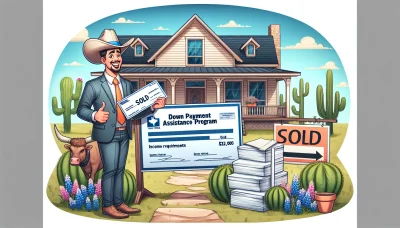Home buying for empty nesters Quiz
Test Your Knowledge
Question of
Understanding the Empty Nester's Home-Buying Journey
Assessing Your Current Living Situation
As an empty nester, assessing your living situation is pivotal. It's time to consider how much space you truly need. With children out of the house, many rooms may go unused, prompting thoughts of downsizing. Reflect on the practicality and emotional attachment to your current homeit's a significant first step.
Next, think about where you want to be. Proximity to family, friends, and essential services should be a top priority. A convenient location can greatly impact your quality of life, allowing for easy visits with grandchildren and access to healthcare or social activities.
Evaluating Space Requirements
Evaluating space requirements involves a balance between comfort and maintenance. Envision your ideal lifestyleperhaps a two-bedroom condo suits your active life better than a sprawling estate. Remember, less space means less upkeep and more freedom.
It's not just about square footage; it's about functionality. Consider the layout: open floor plans may offer easier mobility and spaces that serve multiple purposes can maximize efficiency. Always prioritize what will make your daily routine most enjoyable.
Considering Proximity to Family and Services
Being close to loved ones can provide immeasurable joy in this new chapter of life. Weigh the benefits of living near family against other factors such as climate, community, and amenities. Staying connected has emotional and practical benefits, especially as you age.
Access to healthcare, shopping, and entertainment is crucial. Opt for locations that offer a variety of services within a short distance. This not only adds convenience but also ensures support systems are readily available if needed.
Analyzing Market Trends for Downsizing
Keep a keen eye on real estate trends specific to downsizing. Market fluctuations can affect the value of both selling your current property and purchasing your next home. Timing is everythingyou want to maximize returns while securing a new nest egg.
Research areas popular with empty nesters that offer growth potential. Communities with an aging population may cater more to your lifestyle needs while also being savvy investment choices due to their increasing demand.
Financial Planning for Your Next Purchase
Budgeting for a smaller home doesn't just mean lower utility bills; it can also mean freeing up capital for retirement pursuits. Assess your finances thoroughlydownsizing might provide financial relief that enables more travel or hobbies.
- Understand Your Limits: Be realistic about what you can afford to avoid financial strain in retirement.
- Factor in All Costs: Remember closing costs, moving expenses, and potential renovations in your budget.
- Plan for the Unexpected: Ensure you have enough savings set aside for health care or emergency repairs.
Exploring Mortgage Options for Seniors
As seniors, there are mortgage options designed with you in mind. Investigate reverse mortgages or refinancing opportunities that might provide better terms given your stage in life.
Speak with financial advisors who specialize in senior financingthey can guide you through options like government programs or loans with favorable conditions for those on fixed incomes.
Planning for Long-Term Housing Costs
Planning ahead is non-negotiable when it comes to long-term housing costs in retirement. Factor in potential increases in property taxes, insurance premiums, and maintenance costs over time.
Explore communities with HOA fees that cover some maintenance tasksthis could streamline expenses and alleviate the burden of unexpected costs down the line.
Choosing the Right Location for Retirement Living
Urban vs. Rural: Weighing the Pros and Cons
When it comes to retirement, the urban-rural divide presents a significant choice. City life offers convenience, with everything from hospitals to cultural centers at your fingertips. Yet, it's often accompanied by the hustle and noise that some may wish to leave behind.
In contrast, rural living promises tranquility and a closer connection to nature. However, one might face longer distances to services and less social interaction. It's crucial to balance personal preferences with practicalities.
Access to Healthcare and Amenities
Healthcare accessibility is paramount for retirees. Urban areas typically boast state-of-the-art medical facilities and specialists. Moreover, amenities like shopping malls and restaurants are plentiful in cities, offering convenience and variety.
Rural areas may require travel for medical appointments or shopping, but this can be offset by community health programs and local markets that foster a sense of belonging.
Community Engagement Opportunities
Urban environments often provide more opportunities for community engagement through clubs, classes, and volunteering. These activities can be essential for staying active and connected during retirement.
Rural communities may offer fewer formal organizations but can have tight-knit communal bonds. Here, involvement often comes through local events and neighborly interactions.
Cost of Living Considerations
The cost of living can vary dramatically between urban and rural settings. Cities generally have higher housing costs, but they also tend to have better public transport options which can reduce the need for a car.
The countryside may offer more affordable housing with larger spaces but consider transportation costs and the price of goods which might be higher due to less competition.
Climate and Lifestyle Preferences
Seeking Warmer Climates
Retirees often seek out warmer climates to avoid the chill of winter months. Places like Florida and Arizona in the US are popular destinations due to their mild winters and sunny days.
However, its important to consider not just temperature but also humidity levels, rainfall, and the potential for extreme weather events when choosing your perfect retirement spot.
Outdoor Activities and Recreation
For those passionate about outdoor recreation, proximity to natural landscapes like mountains, beaches, or parks should be a priority. These settings not only offer leisure activities but also contribute significantly to overall well-being.
Retirement is an excellent time to take up new hobbies or invest time in favorite pastimes like golfing, hiking, or fishingall of which require different geographical features.
Cultural and Social Scene
Cultural offerings such as theaters, museums, concerts, and art galleries provide intellectual stimulation and entertainment options that are especially rich in urban areas.
- Research: Investigate local cultural institutions before settling down.
- Diversity: Seek out locations with diverse cultural offerings for a rounded experience.
- Social Groups: Look into clubs or groups that align with your interests.
- Festivals: Check if there are annual events or festivals that pique your interest.
Rural areas might not have the same density of cultural venues but often host unique local events that reflect regional traditions.
Types of Homes Suitable for Empty Nesters
Single-Level Living Advantages
Single-level homes offer the ultimate ease of movement for empty nesters, eliminating the need to navigate stairs on a daily basis. This type of home is not only stylish but practical, reducing the physical strain as one ages. The seamless flow from room to room is not just a convenience; it's a lifestyle choice that supports aging in place gracefully.
The design of single-level homes often incorporates wider doorways and hallways, which are not only aesthetically pleasing but also ensure accessibility for all mobility levels. This foresight in architecture means that adapting to future needs becomes effortless, allowing homeowners to enjoy their space without barriers.
Safety and Accessibility Features
When considering a new home, empty nesters should prioritize safety and accessibility features. Think slip-resistant floors, well-lit spaces, and step-free entrances. These elements are essential for reducing the risk of falls and injuries, ensuring that the home remains a safe haven as mobility changes.
Bathrooms can be particularly hazardous, so incorporating grab bars, walk-in showers with seats, and raised toilets can make a significant difference. These small adjustments can have a profound impact on confidence and independence in the home environment.
Maintenance and Upkeep Considerations
Low-maintenance homes are a boon for empty nesters looking to spend less time on upkeep and more on enjoying life. Materials like composite decking or metal roofing require minimal effort to maintain while retaining their aesthetic appeal over time.
Landscaping is another area where smart choices pay off; opting for perennial plants or rock gardens can minimize gardening chores. It's about creating an inviting outdoor space without the constant upkeepleaving more time for leisure activities!
Open Floor Plan Benefits
- Easier Socialization: Open floor plans encourage family interaction and entertaining, making hosting gatherings a breeze.
- Better Natural Light: With fewer walls blocking windows, these homes bask in natural lighta mood enhancer and energy saver.
- Versatile Spaces: Without fixed partitions, rooms can easily adapt to changing needs or hobbies over time.
- Increased Resale Value: Open designs are trendy, potentially boosting your home's marketability should you choose to sell.
Gated Communities and Retirement Villages
Gated communities provide an additional layer of security that many empty nesters find appealing. The controlled access points create a sense of exclusivity and minimize unwanted trafficboth vehicular and pedestrian. It's not just about safety; it's about cultivating a serene living environment.
In contrast to standalone homes, retirement villages foster a strong sense of community among residents. They often feature communal areas such as libraries, fitness centers, or hobby rooms that become hubs of social interactionperfect for those seeking an engaged lifestyle post-retirement.
Security and Peace of Mind
Living in gated communities or retirement villages often comes with integrated security systems that offer peace of mind for residents. Surveillance cameras and patrol services are common features that help ensure resident safety around the clock.
The presence of neighbors close by provides an informal network of watchfulness. There's comfort in knowing that help is at hand should any unforeseen situations arisea priceless aspect of community living.
Community Facilities and Social Events
The amenities offered within gated communities or retirement villages are designed with residents' enjoyment in mind. From swimming pools to golf courses, these facilities encourage an active lifestyle without having to venture far from home.
Social events play a critical role too; organized activities like game nights or group outings foster friendships and combat loneliness. These vibrant social calendars keep life exciting and full of opportunities to connect with others who share similar interests.
Homeowners Association Perks and Responsibilities
A Homeowners Association (HOA) can greatly benefit residents by handling much of the communitys maintenance. The HOA ensures that common areas are well-kept, contributing to the overall attractiveness and functionality of the neighborhood.
However, it's important to be aware of HOA fees and regulations before moving in. While they do provide valuable services, they also come with rules that homeowners must followstriking the right balance is key to enjoying all the perks without feeling constrained.
The Process of Selling Your Current Home
Preparing Your Home for Sale
First impressions are everything when selling your home. Start by decluttering each room to make it look bigger and more inviting. Next, focus on staging your space to highlight its best featuresthis could mean rearranging furniture or adding decorative touches. Remember, a well-staged home often sells faster and for a higher price!
When considering repairs and improvements, prioritize changes that increase home value. Fix any glaring issues like leaky faucets or broken windows before moving onto cosmetic upgrades. Fresh paint and updated fixtures can go a long way in boosting appeal without breaking the bank.
Setting the right price is crucial; set it too high, and your home might linger on the market, too low, and you're leaving money on the table. Analyze local market trends and compare similar properties to arrive at a competitive listing price that will attract buyers but still give you the profit you deserve.
Decluttering and Staging Tips
- Maximize Space: Remove excess furniture and personal items to make rooms appear larger.
- Neutralize: Opt for neutral colors for walls and decor to appeal to a broader audience.
- Highlight Features: Draw attention to your home's best aspects, such as a fireplace or natural light.
- Clean Thoroughly: A spotless home suggests well-maintained property to potential buyers.
- Ambiance Matters: Use lighting and pleasant scents to create an inviting atmosphere during showings.
Navigating the Real Estate Market
The timing of your sale can significantly impact the process. Monitor market conditions closely; selling during a seller's market could mean quicker sales and better offers. Be aware of local trends, such as upcoming developments or changes in mortgage rates, which can influence buyer behavior.
A seasoned real estate agent is an invaluable ally. They bring expertise in pricing, marketing, and negotiatingkey elements of a successful sale. Look for someone with a strong track record in your neighborhood who can provide references from satisfied sellers.
Handling offers requires a delicate balance between negotiation skills and understanding market dynamics. Don't rush into accepting the first offerunless it's exceptional. Be prepared to counteroffer and negotiate terms that work in your favor while remaining attractive to the buyer.
Making the Move: Transition and Relocation Tips
Downsizing Your Belongings Effectively
Embarking on a new adventure often means facing the daunting task of downsizing. Start by categorizing your belongings into must-haves, maybes, and can-let-gos. This initial sorting will streamline the process and clarify what truly matters.
Once you've identified items to keep, its time to decide on the fate of the rest. Remember, one persons clutter could be another's treasure! Selling items online or hosting a yard sale are great ways to repurpose your goods while padding your wallet.
For those items not sold, consider donating to local charities or giving them away to friends and family. Anything that remains should be disposed of responsibly, keeping in mind recycling options and community regulations.
Sorting and Organizing Personal Items
Tackle each room methodically, starting with less sentimental items to build your decision-making muscle. Label boxes clearly with contents and intended room in your new home for an organizational edge that will pay dividends on arrival.
Utilize vacuum bags for clothes and soft goods to save space, and wrap fragile items with care. Create an inventory list as you pack; this not only helps with organization but also ensures peace of mind regarding your possessions' whereabouts.
Selling, Donating, or Disposing of Excess Goods
Selling items can be rewarding yet time-consuming. Use popular platforms like eBay or Facebook Marketplace for wider reach. Pricing items fairly increases the chance of sale while ensuring a swift decluttering process.
Donating is a quick way to clear out excess goods while benefiting others. Research local shelters, non-profits, and thrift stores that accept donations. Always check donation guidelines to ensure your items are suitable for drop-off.
Packing Strategies for a Smooth Move
- Start Early: Begin packing weeks in advance to avoid last-minute chaos.
- Quality Materials: Invest in sturdy boxes and packing tape to protect your belongings.
- Heavy Items in Small Boxes: Prevent box breakage and backaches by packing heavy items in smaller containers.
- Labeled Boxes: Clearly label boxes on multiple sides with both content and destination room.
- Essentials Box: Keep a box of essentials separate: toiletries, a change of clothes, snacks, and chargers.
- Fragile Items: Use bubble wrap and packing paper generously around delicate items.
- Avoid Overpacking: Keep box weight manageable to make moving easier on yourself or movers.
- Nestling: Nest smaller items inside larger ones to save space and materials.
Settling into Your New Community
Your new community holds endless possibilities! Make the effort to introduce yourself to neighbors; a friendly hello can pave the way for future friendships and invaluable local insights.
Dive into the heart of community life by joining groups that resonate with your interests. Whether it's a book club or a sports league, shared activities are fantastic ice-breakers and help forge strong social bonds quickly.
Introducing Yourself to Neighbors
A warm smile goes a long way when meeting neighbors for the first time. Consider hosting a small open house or simply knock on doors with some homemade treats as an introduction that wont soon be forgotten!
Joining Local Groups and Activities
Your local community center is a treasure trove of information about clubs, classes, and activities. Embrace these opportunities wholeheartedly they're golden tickets to making connections in your new neighborhood!
Familiarizing Yourself with Local Resources
Navigate your new environment like a pro by familiarizing yourself with essential services such as healthcare facilities, libraries, supermarkets, and public transport networks. A little research now means less stress later!
Financing Options for Empty Nesters
Understanding Reverse Mortgages
Reverse mortgages offer a unique way for empty nesters to tap into their home equity. This financial tool allows homeowners aged 62 or older to convert part of their home equity into cash without having to sell their home or take on additional monthly bills. It's an option that can provide financial flexibility during retirement.
Eligibility and How They Work: To be eligible, you must own your home outright or have a considerable amount of equity. The amount you can borrow depends on your age, the value of your home, and current interest rates. Importantly, the homeowner remains responsible for property taxes, insurance, and maintenance.
Pros and Cons of Reverse Mortgages: On the upside, reverse mortgages provide a steady stream of income and allow you to stay in your home. However, they can be complex and costly due to fees and interest rates. Moreover, they reduce the equity in your home, which may affect your heirs' inheritance.
Alternatives to Reverse Mortgages: Before diving into a reverse mortgage, consider alternatives like downsizing, refinancing, or taking out a home equity line of credit (HELOC). These options may offer more flexibility or lower costs depending on your financial situation and long-term goals.
Leveraging Equity from Your Previous Home
Selling your family home can free up significant capital. Empty nesters often find themselves with a substantial amount of equity that can be reinvested into a new property or used to bolster their retirement savings. The key is to leverage this equity strategically to enhance your financial well-being in retirement.
Investing in Your New Property: When purchasing a new home, consider using the equity from your previous house as a sizable down payment. This approach could lower your mortgage payments and potentially eliminate the need for mortgage insurance, saving you money over time.
- Creating a Financial Safety Net: Diversifying investments with the proceeds from your home sale can create additional income streams. Consider allocating funds into safe investments such as annuities or bonds that provide stability and consistent returns.
- Estate Planning Considerations: It's crucial to understand how leveraging your home's equity impacts your estate plan. Consult with financial advisors and estate planners to ensure any decisions align with your wishes for legacy planning and asset distribution.
Future-Proofing Your New Home Purchase
Aging in Place Design Features
When considering a new home purchase, incorporating aging in place design features is a brilliant move. These elements ensure your home remains comfortable and accessible throughout different phases of life. Think wider doorways, no-step entries, and ergonomic handles!
Accessibility modifications for mobility are not just about immediate needs but also about planning for the future. Features like grab bars in bathrooms, lower kitchen countertops, and slip-resistant flooring can make a world of difference as mobility changes over time.
Smart home technologies are revolutionizing convenience at every age. Voice-activated systems, automated lighting, and security features provide both comfort and safety. Plus, they can be managed remotely, offering peace of mind for both homeowners and their loved ones.
Adaptable living spaces are essential as health changes. Homes with flex rooms that can transition from an office to a bedroom or main-floor master suites offer versatility without the need for drastic renovations later on.
Planning for Potential Health Care Needs
When it comes to health care needs, location is key. Ensuring your new home is within reach of quality medical facilities can save you stress down the line. It's not just about hospitals but also proximity to clinics and specialists that cater to aging populations.
In-home care services are becoming increasingly popular as they allow individuals to receive professional care in the comfort of their own homes. Planning space for potential live-in assistance or researching local providers early on can streamline transitions should the need arise.
- Evaluate Long-Term Insurance Options: Invest time in understanding various long-term care insurance policies to protect against unforeseen health-related expenses.
- Maintain Flexibility: Choose insurance plans that offer flexibility to adapt coverage as your healthcare needs evolve over time.
- Understand Policy Details: Be aware of what is covered under each plan, including limitations and exclusions, to avoid surprises later on.
- Consider Affordability: Balance the comprehensiveness of coverage with what you can afford in premiums to ensure it's sustainable for the long haul.
- Plan Ahead: Dont wait until health issues arise; secure insurance when you're healthier to benefit from better rates and coverage options.
The list above outlines crucial considerations when exploring long-term insurance options as part of future-proofing your new home purchase. It's vital to cover all bases affordability, flexibility, and comprehensiveness ensuring you're well-prepared for whatever life throws your way!
Legal and Tax Implications of Buying Real Estate as an Empty Nester
Understanding Estate Planning and Inheritance Laws
Embarking on the journey of real estate investment as an empty nester requires a solid grasp of estate planning and inheritance laws. It's crucial to understand how your property will be distributed posthumously. Different states have varying laws, so consulting with a legal professional is highly recommended to ensure your estate is handled according to your wishes.
Diving into the world of real estate means considering the implications for your heirs. It's imperative to familiarize yourself with the tax burden they may face and the legal mechanisms available to mitigate these effects. This knowledge will prove invaluable in safeguarding their financial future.
Creating or Updating Your Will
Purchasing property later in life necessitates revisiting your will or establishing one if you haven't already. This document is pivotal in ensuring your real estate assets are allocated precisely as you intend. Don't leave anything to chance; make sure your will speaks clearly about your wishes.
An updated will is the cornerstone of a hassle-free inheritance process. By detailing your real estate holdings within it, you provide clarity and direction, which can prevent potential disputes among beneficiaries. Ensure peace of mind both for yourself and for those you love by keeping your will current.
Trusts and Asset Protection Strategies
Trusts offer a robust solution for managing and protecting assets, including real estate. They not only help in avoiding probate but can also offer tax advantages and protect your legacy from creditors or legal challenges. Exploring different types of trusts is vital in finding the right fit for your asset protection strategy.
Asset protection strategies are not just about shielding wealth but also providing ease of management during one's lifetime. Trusts can be structured to reflect specific wishes regarding the distribution and use of assets, making them an essential tool for any savvy empty nester looking to buy property.
Beneficiary Designations and Probate Avoidance
The designation of beneficiaries is often overlooked yet it's a powerful tool in estate planning, especially when it comes to real estate assets. By designating beneficiaries, you can ensure that properties bypass probate, facilitating a smoother transition upon your passing.
Avoiding probate is not just about speeding up the inheritance process; it also preserves privacy and reduces administrative costs. Ensure that all beneficiary designations are up-to-date after acquiring new property to take full advantage of these benefits.
Navigating Property Taxes and Exemptions
Real estate ownership as an empty nester brings with it a set of tax considerations that must be navigated carefully. Understanding how property taxes work, identifying potential exemptions, and knowing when to appeal assessments are crucial steps in managing your financial obligations effectively.
Property taxes can significantly impact your annual expenses; therefore, it pays to be informed. Staying abreast of changes in tax legislation could uncover new saving opportunities or exemptions available exclusively for senior homeowners.
Senior Tax Exemption Eligibility
- Age Requirements: Most jurisdictions require individuals to be above a certain age, typically 65 or older, to qualify for senior tax exemptions.
- Income Limits: Income restrictions often apply, meaning that high-income seniors may not be eligible for property tax reductions.
- Residency Rules: To qualify for exemptions, seniors usually need to prove permanent residency in the home they're seeking tax relief on.
- Filing Deadlines: There are strict deadlines for applying for senior tax exemptions which vary by state or locality; missing these can mean losing out on potential savings.
- Documentation: Be prepared with necessary documentation such as proof of age, income statements, and residency verification when applying for exemptions.
- Ongoing Eligibility: Some exemptions require annual recertification; staying informed about renewal procedures ensures continuous benefit from the exemption.
Property Tax Assessment Appeals
If you believe your property has been overvalued by tax assessors, don't hesitateappeal! It's crucial to understand the appeals process in your area and meet all deadlines. A successful appeal could result in substantial savings on property taxes each year.
Gathering evidence such as recent sales figures for similar properties or an independent appraisal can strengthen your case during an appeal. Presenting clear and compelling data could sway assessors to adjust their valuation more favorably towards you.
Capital Gains Implications on Sale
Selling real estate as an empty nester can come with significant capital gains implications. It's important to understand how these gains are calculated and what exclusions or deductions might apply to minimize the tax hit on profitable sales transactions.
Certain strategies can help mitigate capital gains taxes such as leveraging IRS Section 1031 exchanges or converting investment properties into primary residences before selling. Always consult with a tax advisor before making decisions that could affect your capital gains situation.












